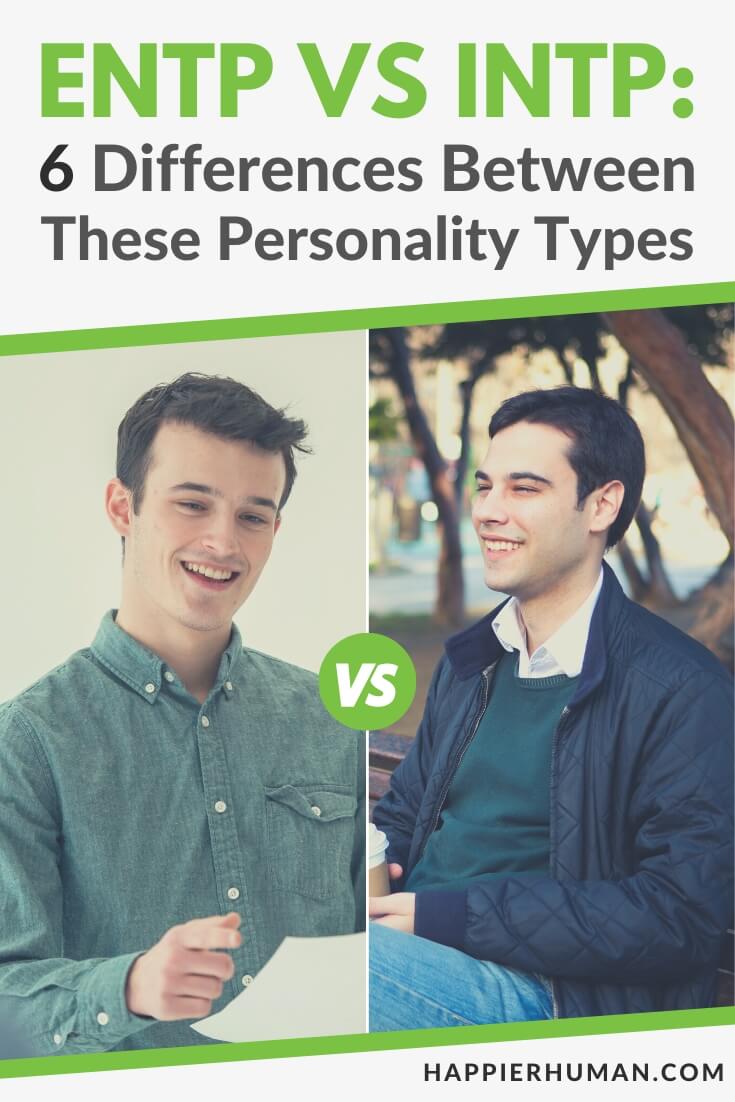ENTPs and INTPs are perceptive and intuitive, focusing on the future and tending to think every decision through. They both thrive on direct and clear communication and are viewed as kindred spirits. Although they can be similar, ENTP and INTP personalities differ in many aspects.
In this article, we’ll enter the ENTP vs. INTP debate and discuss their traits and potential flaws.
What Is the ENTP Personality Type?
According to the Myers-Briggs Type Indicator, the ENTP personality type is one of the 16 personality types. ENTP stands for:
People with this personality type are audacious and quick-witted. One of their most significant qualities is that they aren’t afraid to stand up for their beliefs. ENTPs enjoy verbal sparring and heated discussions.
The more controversial the topic, the better. It comes as no surprise, therefore, that ENTPs are also called debaters.
Due to their debating nature, ENTPs are often perceived as mean-spirited and disagreeable, but this isn’t the case. They’re knowledgeable and tend to have a great sense of humor. Their idea of fun simply involves a bit of debate.
ENTPs are known for their rebellious spirit. There’s no idea, concept, or belief they can’t challenge. In fact, ENTPs will sometimes question their own beliefs and convictions.
Here are the most notable strengths of ENTPs:
Nobody is perfect, and debaters are no exception. Some of their weaknesses are:
What Is the INTP Personality Type?
According to the Myers-Braggs theory, INTP stands for:
INTPs are creative, inventive, and inquiring. They pride themselves on their sharp intellect and unique points of view. Their mind is always working and buzzing with ideas, insights, and questions. People with this personality type are also called logicians.
To others, INTPs can seem like they’re constantly daydreaming. This is why they’re often perceived as reserved or detached, even though that’s not true; INTPs are simply trapped inside their own heads and can’t stop their train of thought.

These people are introverted and tend to avoid large, unfamiliar crowds. However, this doesn’t mean INTPs don’t enjoy good company. When they find someone who matches their energy, they’ll grab the opportunity to pick their brain and start an interesting discussion.
Since their mind is constantly active, INTPs are no strangers to changing their minds rapidly, from their outfit choice to a moral principle they firmly believe in.
These are the biggest strengths of INTPs:
These are some of their weaknesses:
What Do ENTP and INTP Personalities Have in Common?
One of the most notable similarities between the ENTP and INTP personalities is their love of discussion. Their eyes light up when they talk about their beliefs, values, and opinions on a wide range of subjects.
Both personalities rely on their intuition, but that doesn’t mean they make rash decisions. Instead, ENTPs and INTPs like to think things through, analyze their options, and then make important choices.
Another trait these personalities have in common is their perceptiveness. They’re great at observing and understanding the things that surround them. These people pick up on even the most minor details and engage all their senses to get a clearer picture of a particular situation.
Finally, both personality types thrive on direct and clear communication.
6 Key Differences Between the ENTP and INTP Personality
Despite their similarities, these two personality types differ in many aspects. Let’s shed light on the most significant ENTP vs. INTP differences.
1. ENTPs Are Extroverted, INTPs Are Introverted
Let’s start with the most obvious difference that can be spotted by merely looking at the acronyms. ENTPs have an extroverted nature. Contrary to popular belief, being an extrovert isn’t synonymous with being loud and boisterous.
Instead, extroverts draw energy from their surroundings. They enjoy socializing and have exceptional people skills. Due to this extroverted trait, ENTPs like working in a team and are comfortable spending time in large groups.
In addition, they usually have no trouble expressing their opinions, emotions, and beliefs and enjoy hobbies like debating or public speaking.
ENTPs tend to have many friends, but these relationships often don’t feel as strong. People with the ENTP personality type feel drained when they have to spend a lot of time by themselves.
On the other hand, we have INTPs who have an introverted nature. Introverts are often wrongfully perceived as shy or socially awkward, but these characteristics have nothing to do with introversion.
Introverts recharge their batteries when they’re alone. They enjoy their “me” time, and that’s where they get their energy. While introverts, INTPs won’t miss a chance to start an interesting discussion.
However, this usually happens with the people they feel close to. Due to their nature, introverts typically have a few close friends and need some downtime after socializing.
2. INTPs Exhibit Greater Autonomy
Because of their extroverted nature, ENTPs often depend on others. They enjoy exploring ideas and concepts with others who don’t necessarily have to agree with them. Since they’re energetic and active, INTPs often struggle to focus on a particular task.
They tend to get distracted, but this doesn’t seem to bother them. They simply move on to exploring the next topic. INTPs are known for their inexhaustible curiosity, so they often display a remarkable versatility of interests.
INTPs are more independent. Many prefer written communication instead of calling or talking in person. While they enjoy quality discussions, INTPs won’t solicit the help, advice, or input of others.
Instead, they make their decisions on their own after giving them much thought. People with the INTP personality usually have a narrower range of topics they’re interested in.
3. ENTPs Tend to Suppress Their Emotions More
In personal relationships, ENTPs tend to gravitate towards people who enjoy occasional rounds of intellectual debate. The last thing they want to hear is “you’re right,” unless they are confident they managed to win the argument.
If they’re wrong, ENTPs won’t back off until they hear every detail regarding their logic's flaws. It’s important to clarify these debates are never about dominance. ENTPs enjoy intellectual stimulation; winning isn’t their priority.
Since they rely on reason, ENTPs tend to suppress their emotions. They often don’t know how to react in emotional situations. Instead of comforting their friend or offering them a shoulder to cry on, ENTPs try to rationalize the problem and offer constructive, logical solutions. While this isn’t wrong, it’s often not what the other person needs at that moment.
While INTPs are also more rational, they are warmer and can provide emotional support to those close to them. This may be due to their introverted nature, meaning they have deep connections with a few people they feel comfortable with. As a result, they can be great listeners and give great advice.
4. ENTPs Look at the Bigger Picture, INTPs Are More Focused on Details
These two personality types have different approaches to problem-solving. People with the ENTP personality type think on a large scale. They always look at the bigger picture and apply general patterns to understand a situation and come up with a solution.

INTPs are detail-oriented. They consider individual facts and tend to examine the past to understand the present. They’ll often use their past experiences and apply them to present situations.
5. ENTPs Are More Impulsive
Both INTPs and ENTPs enjoy exchanging opinions with others. However, they tend to have different perceptions of these discussions. ENTPs won’t overthink before speaking. They’ll jump on a topic, begin talking, and then come up with something to say next.
This doesn’t impose a problem for them due to their extroverted spirit. Of course, this doesn’t mean ENTPs will say whatever just to keep talking. They do have a plan in their head but don’t mind improvising.
In contrast, INTPs tend to think more before speaking. Their analytic, introverted spirit doesn’t allow them to be as spontaneous as they may want. Whether it’s fear of embarrassing themselves or the need to follow a plan, INTPs aren’t as impulsive.
6. INTPs Are More Common
Both INTP and ENTP personality types are very rare.
Approximately 3.3% of the U.S. population has the INTP personality type.
It’s estimated that around 3% of the U.S. population falls into the ENTP category, and it’s more common in men. Out of the 3%, approximately 62% are males.
Final Thoughts on the ENTP and INTP Personalities
People with ENTP and INTP personalities are armed with sharp intellect and rationalism. Both love learning new things, expanding their views, and discussing their opinions with others. Neither type starts a discussion to win it. They simply enjoy the process and the intellectual connection they feel with others.
While these two types exhibit numerous similarities, they have several differences. The most significant ENTP vs. INTP contrast is the source of their energy. ENTPs draw their energy from their surroundings and socializing, while INTPs get their energy from being alone.
If you want to learn more about other Myer-Briggs personality types, check out our guide on 16 personalities.
Finally, if you want to identify YOUR personality type, then take one of these 11 personality tests to better understand what makes you tick.


